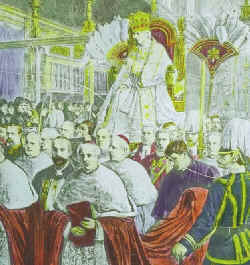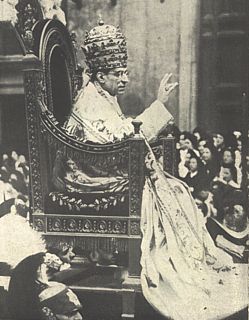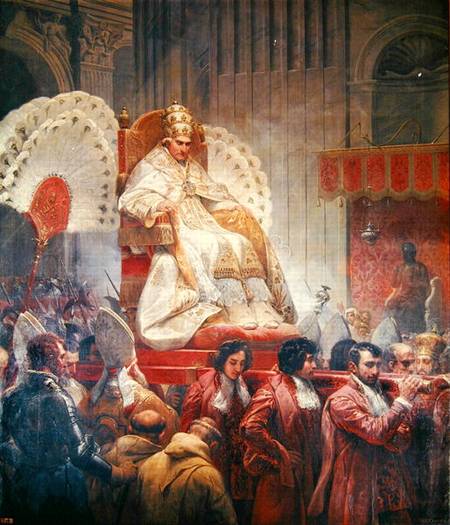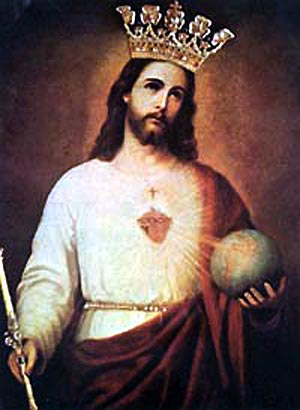 Hoc est Corpus Meum; Hic est Sanguis Meus.
Hoc est Corpus Meum; Hic est Sanguis Meus.
Hoc fácite in meam commemoratiónem.O the grandeur and simplicity of the Mass of the Divine Power! With words so brief and so unostentatious Our Lord gave fulfillment to one of the solemnest of prophecies:
“From the rising of the sun even to the going down, My Name is great among the Gentiles: and in every place there is Sacrifice and there is offered to My Name a Clean Oblation. For My Name is great among the Gentiles” (Malach. 1:2).
The glory of God’s Name and knowledge of It spread throughout the world: these are the fruits of the Holy Sacrifice of the New Covenant. It is the divine bestowal in answer to the first petition of the Our Father: Hallowed be Thy Name. How often of my Jesus, I have felt ashamed of the fruitlessness of my priesthood! I made a sad mistake. With just the daily celebration of the Mass I co-operate to bring about the greatest good of God and of creatures: the furtherance of the glory of the Lord.

To consecrate the Body and Blood of Christ is the Church’s mightiest exercise of power. To approach with imperiousness, with three words, the Right Hand of God, the Bosom of the Father, and there to lay hold, in a certain sense, on the Only-Begotten Son and bring Him down to earth; to renew each day, each hour, each moment, over the face of the earth, the most glorious, the most meritorious feat of the Word of God, His Sacrifice; to earn, to seek, and find, for all Her countless children their daily Bread, and to feed them with It… almost force It upon them, lest they hunger, faint and die. O Lord! For this alone Thy Church is worthy to be named mankind’s chief Benefactress, and this our priestly dignity, the greatest and holiest power for good on earth.

The Holy Mass, besides being the chief act of adoration and submission to God, and therefore the primary expression of worship, is the most effectual of supplication. It has been the Church’s tactics in every age to put before the eyes of God the Name of His own Son; She has never dared to pray without this recommendation: per Dóminum nostrum Jesum Christum Fílium Tuum. How much greater, then, will Her appeal be in the sight of the Father when She presents to Him not merely the Name and remembrance of His Son but the very Son in Person, real and consubstantial with Him, seated on His Right Hand and likewise offering Himself on Calvary!

Such is the grandeur of the August Sacrifice of Our Altars that God has brought the downfall of every other religious sacrifice in Its trail. Polytheistic religions fell, and with them their sacrifices, human sacrifices very often as in ancient America. The new religions appearing after Christ, even heterodox Christian cults, are without sacrifice and sacrificer. But in Thy Church, O Lord, Thou hast wished to perpetuate the Offering of the Pure and Only Victim, the Lamb of God that taketh away the sins of the world.

RESPECT FOR THE MASS AND THE CELEBRANT
Pope St. Gregory says: “Who will doubt that at the moment of the Immolation the Heavens open? Or that the Angelic choirs are in attendance at this Mystery of Jesus Christ? And that the highest and the lowest, the visible and invisible, become one thing? Et summa et ima sociáre unúmque ex invisibílibus et visibílibus fíeri?” St. John Chrysostom, Augustine, and other Fathers expound the same ideas. According to them, during the Holy Sacrifice, the Altar is surrounded by legions of glorious spirits. What wonder that Angels should attend, and attend with infinite self-abasement, where the very Lord of the heavenly choirs stoops to such depths of infinite condescension! I quite believe it. What I find difficult to believe is that a worm of the earth like me should be invested with such an awe-inspiring dignity, and that in my hands should become incarnate, as it were, the “full of grace and of truth,” the Only-Begotten of the Womb of the Virgin Mary.

Let us consider the tremendous respect with which the Church, in Her Liturgy, surrounds the Celebrant. He can be the humblest of priests, an unknown chaplain or curate, one lacking in virtue and learning and without social standing; but scarcely has he reached the Altar to say Mass, when he is given all the honors and preferences. Would Jesus Christ Himself be given better treatment were He to appear in Person as Sacrificer, robed in the Sacred Vestments? All the faithful, without exception: kings, princes, bishops, and even the Roman Pontiff, if present, will remain on bended knees while the Celebrant stands; and in reciting the Confíteor, the Pope himself will bow towards him and say: Et tibi, Pater… et te, Pater, and will prostrate to receive his blessings. How clearly the rubrics and ceremonies give to understand that during the most Holy Sacrifice only two persons demand attention and supreme respect: Jesus Christ, under the Sacramental Species, and the Priest, whose voice is instrumental of Christ’s Presence!

The Mass is the very Immolation of Calvary, and therefore, the goal of Christ’s coming to the world and living in mortal flesh. And in the Mass, the same as on Golgotha, there can intervene, at least attend, a great variety of people in a variety of roles. What is the role of the Priest when celebrating? Will he be one of Christ’s executioners? One of the soldiers offering the Victim gall and vinegar? One of those cruel adversaries who mock at His sorrows and blaspheme? One of the crowds of the merely inquisitive who get a thrill from the tragic details of an execution? Or will he be found among those good souls who believe in Christ and accompany Him in His prayer and Agony? Will he stand between the Mother and the beloved Disciple? NO. My place and role, when saying Mass, is pre-eminent: I have identified myself with the Divine Victim and Sacrificer, with the Lamb of God and the Eternal Priest Who immolates It; through my lips speak the lips, the Omnipotence, and the Heart of Christ: Hoc est Corpus Meum; Hic est Sanguis Meus.

Resolution
1) I promise my Lord, and I promise myself, in my great representative capacity at the Altar, at least a profound interior respect. And exteriorly, I shall see to it that wherever the Mass is concerned there shall be absolute conformity with the prescriptions [Rubrics] of the Liturgy, especially in connection with the cleanliness of vestments, sacred vessels, altar clothes, corporals, purificators, etc.; and also in the tidy appearance of the church and its Altars. I shall bear out the truth of my daily declaration: Dómine, diléxi decórum domus tuæ (Ps. 21:8).

2) And since the veneration which the Mass inspires the faithful depends, in no small measure, upon the priest’s
pious observance of the rubrics, I propose to revise the
ceremonies of the Missal, so that in all earnestness, and as soon as possible, I may examine my conscience on how I abide by them.
I desire, for the Savior’s sake, to win the compliment paid to St. Vincent de Paul: “There indeed you have a priest who says Mass well!”

 Dalmatic
Dalmatic






























